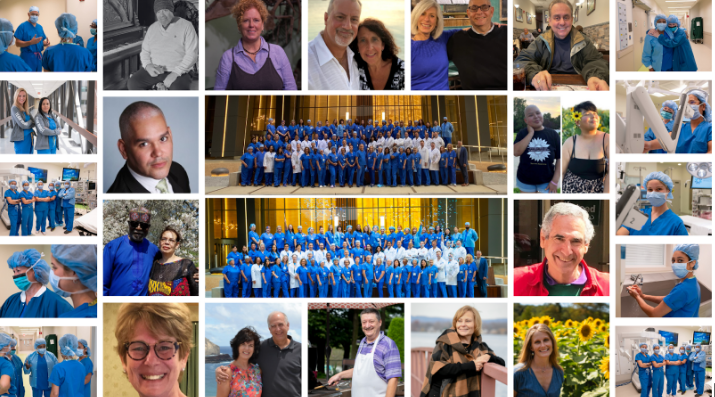Hackensack Meridian Hackensack University Medical Center Performs 25,000 Robotic-Assisted Surgical Procedures
July 19, 2023
Hackensack Meridian Hackensack University Medical Center is now part of an elite group of hospitals in the U.S. to have performed 25,000 robotic surgical procedures, enough to fill the Red Bull Arena soccer stadium in Harrison, New Jersey. Minimally invasive robotic-assisted surgical care benefits the patient, including lower risk of infection, less pain after surgery, and a faster recovery and return to normal activities.

Experience Matters
Hackensack University Medical Center’s robotic surgery program is the largest and most experienced in the state — and one of the busiest in the nation. This 25,000 robotic surgery puts Hackensack University Medical Center in the top 1% of hospitals in the country that have achieved this milestone.
“Our surgeons have been pioneers in the use of robotic surgical technology since they performed New Jersey’s first robotic surgery more than 20 years ago,” said Robert C. Garrett, FACHE, the chief executive officer of Hackensack Meridian Health. “The team has also pioneered the use of single-port robotic surgery, which allows our surgeons to perform complex procedures through a single, half-inch incision — reducing the trauma associated with surgery compared to other approaches.”
Jeremy J. Broecker knows just how necessary this experience with robotics is. He recently drove over 1,200 miles from his hometown in Minnesota to have a single port robot surgery at Hackensack University Medical Center to treat Ureteropelvic Junction Obstruction. In this condition, blockage occurs at the junction where the ureter attaches to the kidney.
“I watched Dr. Stifelman’s videos online and was inspired by his skill and confidence. I knew if I could get him to do my surgery that I was going to go for it,” explains Jeremy. “I was able to get a quick surgery date, much sooner than I was offered locally. The facility was very clean and the recovery room was similar to a four star hotel room which also boasted amazing views. So far I’ve enjoyed a swift recovery and am excited to move on with my life.”
Further distinguishing Hackensack University Medical Center as a Center of Excellence in advanced robotic surgery, the team became the first hospital in the U.S. to perform their 1,000th single-port robotic surgery with the da Vinci Single Port (SP) system in March 2023. Hackensack University Medical Center was the first and only hospital in New Jersey to have access to single-port technology in 2018, and to date, 25 percent of the single-port robotic procedures in the U.S. are performed at Hackensack University Medical Center.
“Surgeons travel from some of the most prestigious national and international medical centers to learn from the robotic surgery experts at Hackensack University Medical Center,” said Mark Sparta, FACHE, president and chief hospital executive, Hackensack University Medical Center. “We are proud of our commitment to combining advanced technology, pioneering surgical techniques, and world-class surgeons to deliver outstanding patient outcomes.”
In June 2023, Dr. Med. Georg Schoen, Chief Physician of Robotic Urosurgery at the Urological Clinic at Munich Planegg in Germany, visited the urology team at Hackensack University Medical Center to learn about single-port kidney and prostate surgery. Dr. Schoen observed surgeries and technique demonstrations performed by Michael D. Stifelman, MD, Chair of Urology and Director of Robotic Surgery at Hackensack University Medical Center, and Professor and Founding Chair of Urology at Hackensack Meridian School of Medicine; and Mutahar Ahmed, MD, Director of the Center for Bladder Cancer, Hackensack University Medical Center, Associate Professor of Urology, Hackensack Meridian School of Medicine, and Director, Robotic Fellowship Program, New Jersey Urology.
“When it comes to delivering robotic surgical outcomes that consistently exceed national benchmarks for safety and quality, experience matters,” said Dr. Stifelman. “When patients choose Hackensack University Medical Center for their robotic surgery, they receive care from some of the country’s highest-volume surgeons — many of whom are fellowship-trained, have been performing robotic surgical procedures for decades, and conducted groundbreaking research to advance the field of robotic-assisted surgery.”
About Robotic-Assisted Surgery
Robotic-assisted surgery is performed through one or more small incisions using a robotic surgical system, which includes one or more robotic arms, a 3D, high-definition camera, and a surgical console with controls and a video screen that displays a real-time, enhanced view of the surgical area. During the procedure, the surgeon sits at a console next to the patient and controls the movement of surgical tools inserted into the patient’s body.
Benefits of robotic-assisted surgery include:
- Increased precision, as the robot offers greater flexibility, stability, and range of motion than a human hand
- Decreased blood loss and reduced need for transfusions
- Less risk of infection
- Less pain after surgery
- Smaller external and internal scars
- Shorter hospital stay
- Faster recovery and return to normal activities
Hackensack University Medical Center offers robotic-assisted surgery in 11 specialties, including:
- Bariatric (weight-loss) surgery
- Cardiology
- Colorectal surgery
- Ear, nose, and throat (ENT) surgery
- General surgery
- Gynecology
- Gynecologic oncology
- Orthopedics
- Thoracic surgery
- Urogynecology
- Urology
In Jeremy’s case, he was hiking in less than a week. “Thanks to the advancements in robotic surgery and the pioneers such as Dr. Stifelman, the surgery only required ONE small cut hidden in my belly button. In my case, I did not need narcotic pain medication and was walking around a couple of hours after surgery and hiking a few days later. I’ve quickly recovered and highly recommend Dr. Stifelman and his Hackensack University Medical Center team.”
